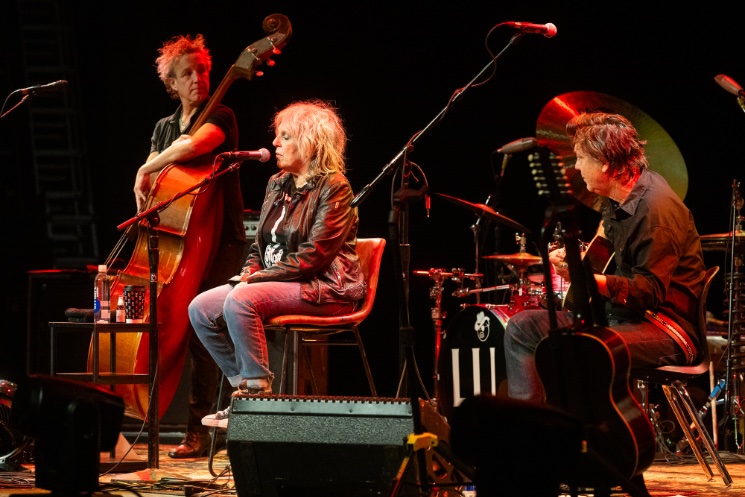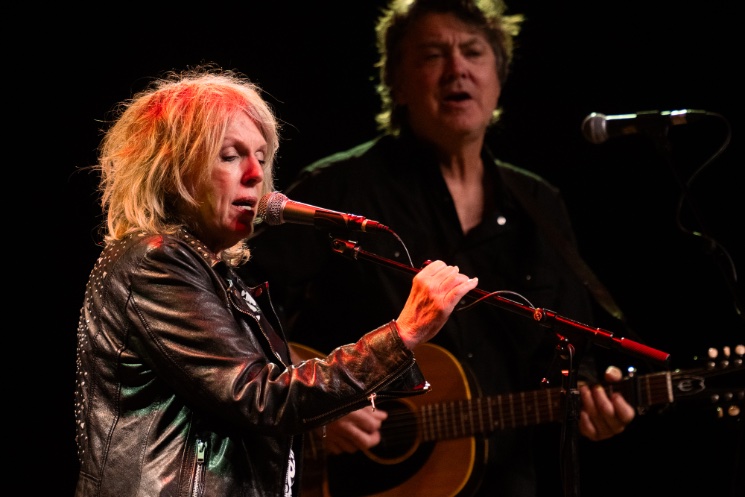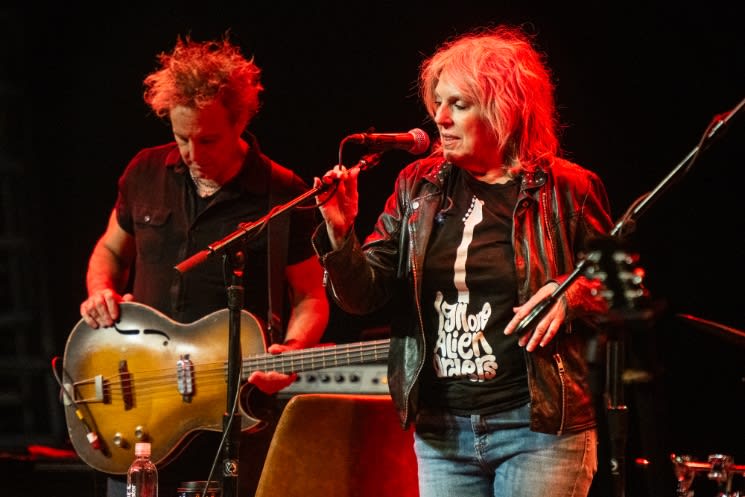"I've known some beautiful misfits in my life," Lucinda Williams told the crowd at the Queen Elizabeth Theatre, perched on a chair with a smile on her face and her converse shoes gently swinging. "I used to call them beautiful losers, but I changed the wording a bit."
Last night's show — a whopping two-hour-and-thirty-five-minute odyssey through Williams's various lives — was a tribute to these drunken angels and magnetic outsiders, as much an evening of storytelling as it was of music.
Williams suffered a stroke in 2020, and its effects still loiter in her body. The journey to recovery has been a long and winding one — she can't play her guitar ("Temporarily anyway, which is what I keep telling myself"), and she was unsteady on her feet, alternating between "sitting songs" and "standing songs," her left hand curled at her waist. Her careful, wobbling movements belied the great knocking engine of charisma and humour that still rumbles in Williams, and she took the crowd on a patient and winding drive through her past, steered by her wit and still-inimitable voice.

Each song — a collection of Williams's peerless originals and covers of Elizabeth Cotton's canonic "Freight Train," Bob Dylan's "It Takes a Lot to Laugh, It Takes a Train to Cry" and Hank Williams's "Jambalaya (On the Bayou)" — was introduced by a story, as long or short as Williams saw fit, that detailed the conversations and flavours and towns and people that inspired it.
At times aided by a teleprompter at the foot of the stage, Williams spun stories about her father Miller Williams, poet and professor; her grandparents in Baton Rouge, who would send her out back to pick her own switch when she'd misbehaved; her life-changing journey to '70s Los Angeles, where she first felt the heat of the industry machine; lost friends and brothers and inspirations, the colours and textures of life in the south. It was an exceedingly generous and moving evening, and Williams managed to balance the sombre memorials with regular bolts of laughter.

She acknowledged her own taste for life's shadowy corners — "Hey, let's go see Lucinda Williams play, I feel like getting suicidally depressed," she joked after recounting the 1989 shooting death of fellow musician Blaze Foley — but the songs were always there to burn off any helplessness. Dedicated to Foley, "Drunken Angel" rang as cold and clear as it first did in 1998, as did "Car Wheels on a Gravel Road" and 1988's "Crescent City" — Williams's voice is as gorgeous and imperfect as ever, a one-of-a-kind gift that coloured songs like "Fruits of My Labor," "Bus to Baton Rouge," "Those Three Days" and "Dust" (the lyrics to which were pulled from her father's poetry) with a hard-won power.
The night felt like it could've carried on forever, but all good things gotta end — after a perfunctory fakeout walk-off that Williams didn't bother leaving the stage for, the members of Buick 6 returned for a finale of this year's "Rock n Roll Heart" and a wily extended jam on Williams's "Joy" and Jimi Hendrix's "Voodoo Child." It was a galvanizing, grin-plastered end, and it spurred the third standing ovation of the night, a great surge of thanks that couldn't possibly repay the gift of Williams's time and tenacity.
Last night's show — a whopping two-hour-and-thirty-five-minute odyssey through Williams's various lives — was a tribute to these drunken angels and magnetic outsiders, as much an evening of storytelling as it was of music.
Williams suffered a stroke in 2020, and its effects still loiter in her body. The journey to recovery has been a long and winding one — she can't play her guitar ("Temporarily anyway, which is what I keep telling myself"), and she was unsteady on her feet, alternating between "sitting songs" and "standing songs," her left hand curled at her waist. Her careful, wobbling movements belied the great knocking engine of charisma and humour that still rumbles in Williams, and she took the crowd on a patient and winding drive through her past, steered by her wit and still-inimitable voice.

Each song — a collection of Williams's peerless originals and covers of Elizabeth Cotton's canonic "Freight Train," Bob Dylan's "It Takes a Lot to Laugh, It Takes a Train to Cry" and Hank Williams's "Jambalaya (On the Bayou)" — was introduced by a story, as long or short as Williams saw fit, that detailed the conversations and flavours and towns and people that inspired it.
At times aided by a teleprompter at the foot of the stage, Williams spun stories about her father Miller Williams, poet and professor; her grandparents in Baton Rouge, who would send her out back to pick her own switch when she'd misbehaved; her life-changing journey to '70s Los Angeles, where she first felt the heat of the industry machine; lost friends and brothers and inspirations, the colours and textures of life in the south. It was an exceedingly generous and moving evening, and Williams managed to balance the sombre memorials with regular bolts of laughter.

She acknowledged her own taste for life's shadowy corners — "Hey, let's go see Lucinda Williams play, I feel like getting suicidally depressed," she joked after recounting the 1989 shooting death of fellow musician Blaze Foley — but the songs were always there to burn off any helplessness. Dedicated to Foley, "Drunken Angel" rang as cold and clear as it first did in 1998, as did "Car Wheels on a Gravel Road" and 1988's "Crescent City" — Williams's voice is as gorgeous and imperfect as ever, a one-of-a-kind gift that coloured songs like "Fruits of My Labor," "Bus to Baton Rouge," "Those Three Days" and "Dust" (the lyrics to which were pulled from her father's poetry) with a hard-won power.
The night felt like it could've carried on forever, but all good things gotta end — after a perfunctory fakeout walk-off that Williams didn't bother leaving the stage for, the members of Buick 6 returned for a finale of this year's "Rock n Roll Heart" and a wily extended jam on Williams's "Joy" and Jimi Hendrix's "Voodoo Child." It was a galvanizing, grin-plastered end, and it spurred the third standing ovation of the night, a great surge of thanks that couldn't possibly repay the gift of Williams's time and tenacity.
